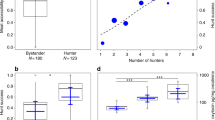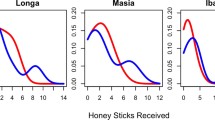Abstract
This paper presents quantitative data on altruistic cooperation during food acquisition by Ache foragers. Cooperative activities are defined as those that entail a cost of time and energy to the donor but primarily lead to an increase in the foraging success of the recipient. Data show that Ache men and women spend about 10% of all foraging time engaged in altruistic cooperation on average, and that on some days they may spend more than 50% of their foraging time in such activities. The most time-consuming cooperative activity for both sexes is helping during the pursuit of game animals, a pattern that is probably linked to the widespread sharing of game by Ache foragers. Cooperative food acquisition and subsequent food redistribution in hunter-gatherer societies are critical behaviors that probably helped shape universal, evolved, cooperative tendencies that are well illustrated in modern experimental economics.
Similar content being viewed by others
References
Altman, J. 1987 Hunter-Gatherers Today: Aan Aboriginal Economy of North Australia. Canberra: Australian Institute of Aboriginal Studies.
Alvard, M. 2001 Mutualistic Hunting. In The Early Human Diet: The Role of Meat, C. Stanford and H. Bunn, eds. Pp. 261–278. Oxford: Oxford University Press.
Bailey, R. 1991 The Behavioral Ecology of Efe Pymy Men in the Ituri Forest, Zaire. Anthropological Papers No. 86, Ann Arbor: Museum of Anthropology, University of Michigan.
Berg, Joyce, J. Dickhaut, and K. McCabe 1995 Trust, Reciprocity and Social History. Games and Economic Behavior 10:122–142.
Boesch, C., and H. Boesch 1989 Hunting Behavior of Wild Chimpanzees in the Tai National Park. American Journal of Physical Anthropology 78:547–573.
2000 The Chimpanzees of the Tai Forest: Behavioural Ecology and Evolution. Oxford: Oxford University Press.
Bohnet, I., and B. Frey 1999 The Sound of Silence in Prisoner’s Dilemma and Dictator Games. Journal of Economic Behavior and Organization 38:43–57.
Boyd, R. 2001 Population Structure, Equilibrium Selection and the Evolution of Norms. In The Evolution of Economic Diversity, A. Nicita and U. Pagano, eds. London: Routledge, in press.
Boyd, R., and P. Richerson 1992 Punishment Allows the Evolution of Cooperation (Or Anything Else) in Sizable Groups. Ethology and Sociobiology 13:171–195.
Brosnan, S. F., and F. B. M. de Waal 2002 A Proximate Perspective on Reciprocal Altruism. Human Nature 13:129–152.
Camerer, C. 2001. Social Preferences in Dictator, Ultimatum, and Trust Games. In Behavioral Game Theory: Experiments in Strategic Interaction, C. Camerer, ed. Princeton: Princeton University Press, in press.
Camerer, C., and R. Thaler 1995 Anomalies: Ultimatums, Dictators and Manners. Journal Economic Perspectives 9:209–219.
Cameron, L. 1999 Raising Stakes in the Ultimatum Game. Economic Enquiry 37(1):47–59.
Caporael, L., R. Dawes, J. Orbell, and A. van de Kragt 1989 Selfishness Examined: Cooperation in the Absence of Egoistic Incentives. Behavioral and Brain Sciences 12:683–739.
Connor, R. 1986 Pseudo-reciprocity: Investing in Mutualism. Animal Behavior 34:1562–1566.
Cosmides, L., and J. Tooby 1992 Cognitive Adaptations for Social Exchange. In The Adapted Mind, J. Barkow, L. Cosmides, and J. Tooby, eds. Pp. 163–228. New York: Oxford University Press.
Dawes, R., and R. Thaler 1988 Cooperation. Journal of Economic Perspectives 2:187–197.
Dawes, R., A. J. C. van de Kragt, and J. M. Orbell 1988 Not Me or Thee, but We: The Importance of Group Identity in Eliciting Cooperation in Dilemma Situations—Experimental Manipulations. Acta Psychologica 68:83–97.
Fehr, E., and S. Gächter 2000a Fairness and Retaliation: The Economics of Reciprocity. Journal of Economic Perspectives 14(3):159–181.
2000b Cooperation and Punishment in Public Goods Experiments. American Economic Review 90:980–994.
Fehr, E., U. Fischbacher, and S. Gächter 2002 Strong Reciprocity, Human Cooperation, and the Enforcement of Social Norms. Human Nature 13:1–25.
Fehr, E., G. Kirchsteiger, and A. Riedl 1993 Does Fairness Prevent Market Clearing? Quarterly Journal of Economics 108:437–460.
Forsythe, R., J. Horowitz, N. E. Savin, and M. Sefto 1994 Fairness in Simple Bargaining Experiments. Games and Economic Behavior 6:347–369.
Frank, R. 1988 Passions within Reason. New York: Norton.
Gächter, S., and E. Fehr 1999 Collective Action as Social Exchange. Journal of Economic and Behavioral Organization 39:341–369.
Gurven, M. 2000 To Give and Give Not: The Evolutionary Ecology of Hunter-Gatherer Food Transfers. Ph.D. dissertation, Department of Anthropology, University of New Mexico.
Gurven, M., W. Allen-Arave, K. Hill, and A. M. Hurtado 2000 "It’s a Wonderful Life": Signaling Generosity among the Ache of Paraguay. Evolution and Human Behavior 21:263–282.
2001 Reservation Food Sharing among the Ache of Paraguay. Human Nature 12:273–297.
Gurven, M., K. Hill, A. M. Hurtado, H. Kaplan, and B. Lyles 2000 Food Transfers among Hiwi foragers of Venezuela. Journal of Human Ecology 28:171–218.
Gurven, M., K. Hill, and H. Kaplan 2002 From Forest to Reservation: Transitions in Food Sharing Behavior among the Ache of Paraguay. Journal of Anthropological Research 58(1):91–118.
Hawkes, K. 1993 Why Hunter-Gatherers Work: An Ancient Version of the Problem of Public Goods. Current Anthropology 34:341–361.
Henrich, J., R. Boyd, S. Bowles, C. Camerer, E. Fehr, H. Gintis, and R. McElreath 2001 In Search of Homo economicus: Behavioural Experiments in 15 Small-scale Societies. American Economic Review 91(2):73–78.
Hill, K. 1994 The Ache. In Encyclopedia of World Cultures, Vol. 7, pp. 3–7. Boston: G. K. Hall-Macmillan.
Hill, K., and M. Gurven 2001 Cooperation in Economic Experiments among Ache Foragers. In Cooperation, Reciprocity and Punishment: Experiments from 15 Small-Scale Societies, J. Henrich and R. Boyd, eds. Ms. in preparation.
Hill, K., and K. Hawkes 1983 Neotropical Hunting among the Ache of Eastern Paraguay. In Adaptive Responses of Native Amazonians, R. Hames and W. Vickers, eds. Pp. 139–188. New York: Academic Press.
Hill, K., and A. M. Hurtado 1996 Ache Life History: The Ecology and Demography of a Foraging People. New York: Aldine de Gruyter.
2000 The Ache of Paraguay. In The Cambridge Encyclopedia of Hunters and Gatherers, R. Lee and R. Daly, eds. Pp. 92–96. Cambridge: Cambridge University Press.
Hill, K., and H. Kaplan 1993 Why Do Male Foragers Hunt and Share Food? Current Anthropology 34:701–710.
Holmberg, A. 1969 Nomads of the Long Bow: The Sirionio of Eastern Bolivia. New York: Natural History Press.
Ichikawa, M. 1983 An Examination of the Hunting-Dependent Life of the Mbuti Pygmies, Eastern Zaire. African Study Monographs 4:55–76.
Kaplan, H. 1983 The Evolution of Food Sharing among Adult Conspecifics: Research with the Ache Hunter-Gatherers of Eastern Paraguay. Ph.D. dissertation, University of Utah, Salt Lake City.
Kaplan, H., and K. Hill 1985 Food Sharing among Ache Foragers; Tests of Explanatory Hypotheses. Current Anthropology 26:223–245.
Kaplan, H., K. Hill, K. Hawkes, and A. M. Hurtado 1984 Food Sharing among the Ache Hunter-Gatherers of Eastern Paraguay. Current Anthropology 25:113–115.
Kaplan, H., K. Hill, J. Lancaster, and A. M. Hurtado 2000 A Theory of Human Life History Evolution: Diet, Intelligence, and Longevity. Evolutionary Anthropology 9:156–185.
McMillan, G. 2000 Ache Residential Grouping and Social Foraging. Ph.D. dissertation, Department of Anthropology, University of New Mexico.
Mesterton-Gibbons, M., and L. Dugatkin 1992 Cooperation among Unrelated Individuals: Evolutionary Factors. Quarterly Review of Biology 67:267–281.
Orbell, J., R. Dawes, and A. van de Kragt 1988 Explaining Discussion-Induced Cooperation. Journal of Personality and Social Pyschology 54:811–819.
Rothstein, S., and R. Pierotti 1988 Distinctions among Reciprocal Altruism, Kin Selection, and Cooperation and a Model for the Initial Evolution of Beneficient Behavior. Ethology and Sociobiology 9:189–209.
1989 Definitions and the Genetic Bases of Beneficient Behavior. Ethology and Sociobiology 10:453–456.
Schuster, R. 2002 Cooperative Coordination as a Social Behavior: Experiments with an Animal Model. Human Nature 13:47–83.
Smith, E. 1991 Inujjuamuit Foraging Strategies: Evolutionary Ecology of an Arctic Hunting Economy. New York: Aldine de Gruyter.
Soltis, J., R. Boyd, and P. J. Richerson 1995 Can Group Functional Behaviors Evolve by Cultural Group Selection? An Empirical Test. Current Anthropology 36:473–494.
Sosis, R. 2000 The Emergence and Stability of Cooperative Fishing on Ifaluk Atoll. In Human Behavior and Adaptation: An Anthropological Perspective, L. Cronk, N. Chagnon, and B. Irons, eds. Pp. 437–472. New York: Aldine de Gruyter.
Sosis, R., S. Feldstein, and K. Hill 1998 Bargaining Theory and Cooperative Fishing Participation on an Ifaluk Atoll. Human Nature 9:163–203.
Thaler, R. H. 1992 The Winner’s Curse: Paradoxes and Anomalies of Economic Life. Princeton: Princeton University Press.
Author information
Authors and Affiliations
Corresponding author
Additional information
This paper was originally presented at a Max Planck symposium on cooperation in Leipzig in June 1999. This work was partially funded by a grant from the L.S.B. Leakey Foundation and NSF grant BNS 9727656.
Kim Hill is a professor of anthropology in the Human Evolutionary Ecology (HEE) program at the University of New Mexico. His primary research interests include hunter-gatherer behavioral ecology, life history theory, food acquisition strategies, food sharing, cooperation, and biodiversity conservation in lowland South America. He has done fieldwork with Nahautl, Ache, Guarani, Hiwi, Mashco Piro, Matsiguenga, and Yora indigenous peoples of Central and South America.
Rights and permissions
About this article
Cite this article
Hill, K. Altruistic cooperation during foraging by the Ache, and the evolved human predisposition to cooperate. Hum Nat 13, 105–128 (2002). https://doi.org/10.1007/s12110-002-1016-3
Received:
Accepted:
Issue Date:
DOI: https://doi.org/10.1007/s12110-002-1016-3




